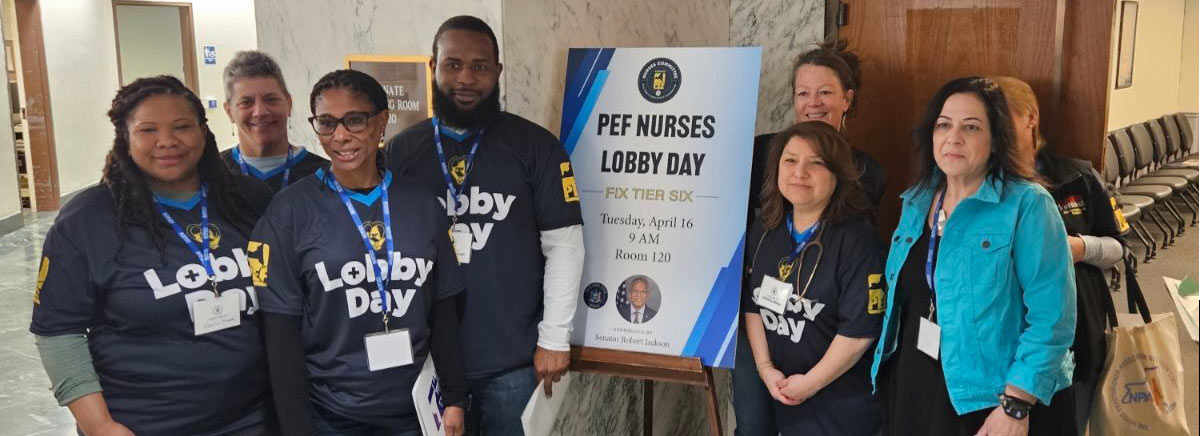

May 7, 2024 — Dozens of PEF nurses from across the state converged on Albany for Nurse Lobby Day on April 15, meeting with members of the state Assembly and Senate to share stories and urge support for Tier 6 reform, bullying legislation, a health care preceptor tax credit program, expanding the nurse staffing committee law to other agencies, saving SUNY Downstate and making the Nurse Practitioner Modernization Act permanent.
PEF represents approximately 10,000 nurses in state employment, with SUNY, the Office of Mental Health (OMH), Office for People with Developmental Disabilities (OPWDD), Department of Corrections and Community Supervision (DOCCS), and the Office of Children and Family Services (OCFS) the largest employers.
Abusive Conduct and “Bullying” Prevention Law
Through the union’s Toxic Tales campaign, PEF members have been sharing stories of bullying and toxic workplaces and as part of the campaign PEF is asking the Legislature to support a bill that would add a new section to the Labor Law to define “bullying,” “cyberbullying,” and “abusive conduct.” The definitions would then enable the creation of a uniform standard of appropriate conduct in the workplace and lead to development and implementation of training for all employees to ensure that everyone understands those standards.
Cindy, from OPWDD, said bullying happens in the workplace “and it shouldn’t because we’re all adults. Bullying can take many forms, from being passed over for a position to being afraid of speaking up for fear of discipline or retaliation.”
Assemblyman Harry Bronson, Chairperson of the state Assembly Labor Committee, who also sponsored the bill, voiced his full support.
“This is on my priority list,” he told the nurses who visited his office. “I have heard horror stories from your members. You should be able to go to work and not be in danger. We will see what we can do. You guys do great work.”
In a poignant example, Vinny Cicatello from Buffalo Psychiatric Center and co-chair of the PEF Nurses Committee, recounted how PEF member Ed Gordon, was stabbed by a patient at the facility earlier this month. Clinicians had voiced concerns the patient was decompensating, which fell on deaf ears. Staff need to be comfortable their voices will be heard, without fearing repercussions if they push harder to be heard.
“The nurses feel like their clinical input is not heard,” said one member to Sen. Jessica Ramos. “Just being constantly threatened, you don’t do this, we can talk about counseling, or it goes right into discipline. If you have any of your own ideas or a different opinion, they kind of put you on this list nobody wants to be on so there’s a huge issue there.”
Sen. Ramos, the Chairperson of the Senate Labor Committee, agreed and indicated that this bill was also on her priority list for the end of the Legislative session.
Region 3 Coordinator Leisa Abraham concurred, referring again to Buffalo PC.
“They question our judgement,” she said. “It’s not unusual for us in this room to have other people, not clinicians, question our judgment. I don’t want to age any of you, but there’s probably hundreds of years’ worth of medical service in this room and if they’re telling me something, I’m listening to them!
“That’s part of what we also see as part of bullying, you end up having situations like this because who’s going to stand up and say, ‘No, you are wrong’ when you know it ends up being ignored,” she said.
PEF’s bullying legislation would be an important piece to take negativity off the table and slow the exodus of people leaving state service because of conduct in the workplace.
Preceptor Tax Credit Program
In a meeting with Sen. Toby Ann Stavisky, the chair of the Senate Higher Education Committee, members made the case for instituting the Health Care Preceptor Tax Credit Program as a way to recruit and retain nursing staff and increase staffing levels.
The legislation would create a personal income tax credit to incentivize participation in various health care clinical training programs, including nursing. The credit would be available to clinicians who provide instruction as part of a clinical preceptorship in both community and inpatient facilities. The proposal is for $1,000 for every 100 hours of community-based instruction, with a maximum of $3,000.
“We believe this gives the opportunity for nurses who want to be preceptors to be able to,” said Cicatello. “Preceptorships engage trained, experienced clinicians with students to provide intense first-hand training to help bridge the gap between classroom education and clinical hands-on training.”
Christina, a nurse at OPWDD, shared that while pursuing a master’s degree, she had difficulty finding a preceptor because they were in short supply. She said the credit program may ease that.
Also, in the meeting with Assemblyman Bronson, members told Bronson mandated preceptors can make new nurses feel shunned when mentors are reluctant participants. One nurse said in her facility they jokingly say they have been “voluntold” to be preceptors.
Speaking to a representative from Assemblywoman Amy Paulin’s office – the Chairperson of the Assembly Health Committee – PEF member Cherie, from OPWDD, said good preceptors are vital for patient care. “New nurses, right out of college, are shaky just taking a blood pressure or placing an IV,” she said. “Good preceptors can make a difference.”
Assemblyman Josh Jensen, the ranking Republican minority member on the Assembly Health Committee, had a good understanding of the importance of a quality preceptorship program. When he worked at Monroe County Hospital’s communications department, they recognized that one way to reduce turnover was to set up preceptor programs.
“It could make it easier for people, so when they enter into the facility they want to stay,” he said. “Where your members are working, those are very high stress work locations, so anything to ease the burden on new employees so they see it as a career and want to stay in that career as long as they can.”
Cicatello agreed, adding: “The ones who want to, that’s how we get a really successful nursing program and staffing program when nurses come in and they feel they’re wanted there and they’re heard there. We think that’s huge.”
“Mistakes can cost you your license,” PEF Vice President Randi DiAntonio said. “Help is needed at the front end. It’s a no-brainer to me.”
Nurse Practitioner Modernization Act
PEF is advocating for passage of a bill that would make the Nurse Practitioner Modernization Act (NPMA) permanent. The act was adopted in 2014 to increase access to health care services and eliminate administrative barriers to care. The NPMA eliminated the requirement that NPs with at least 3,600 hours of practice maintain a Written Practice Agreement or Written Practice Protocols, provided that the NP maintain a collaborative relationship with one or more licensed physicians.
Participants thanked Assemblymember Paulin for her sponsorship of the legislation to make the NPMA permanent and Assemblyman Jensen said he supports the act as well, sharing his experience with nurse practitioners.
“In the nine years that I’ve been with my current physician, I’ve never met him,” he said. “I’ve only ever seen a nurse practitioner or a physician’s assistant. So, in my personal health care decision-making, I trust nurse practitioners. If somebody who’s the ranking member of the Assembly Health Committee can trust a nurse practitioner to help them make healthcare decisions, then why shouldn’t we allow every New Yorker to have that option?
“Especially where you have healthcare deserts, it allows greater access to primary care,” he said. “I’m supportive of scope changes. It’s been pretty good, I think.”
Expand Nurse Staffing Committee Law
Staff on the ground, doing the work, know what nurse-to-patient ratios are appropriate and how staff could best be deployed. Chapter 155 of the New York State Laws of 2021 established clinical staffing committees composed of representatives from management and labor to determine these critical ratios in hospitals and nursing homes covered by Article 28 of the Public Health Law.
PEF wants it to be expanded to cover other facilities operated by the state that provide healthcare services to vulnerable populations at OMH, OPWDD, OCFS, and DOCCS.
“We need to have our nurses be able to have input and be taken seriously,” said VP DiAntonio. “We just had a situation at one of our upstate DDSO locations where the nurses came up with a plan on their own to cover a staffing crisis and the plan was actually working. Management didn’t like it because it didn’t come from them and they basically pulled it out from under them. It left such a bitter taste in people’s mouths.
“Nurses know what their patients need, what their clients need,” she said. “Management may not be able to do everything we want, but there should be a respectful dialogue and they need to be treated with the professionalism they deserve. Somebody sitting in an office that never has walked into a unit or group home shouldn’t be the ones making the decision.”
Assemblyman Jensen opposed the bill at the time of its inception but recognized it may need reform.
“To PEF’s point, about how management is able to have the upper hand in all aspects of it, well that’s not what the intent of the legislation was,” he said. “I think, especially now that we’re out of a public health emergency, while we are still struggling with a nurse staffing crisis, especially upstate, that we need to ensure that there are ratios in place to ensure that patients get the care they need but that we also don’t push more nurses out of the workforce.”
He added: “When the legislation was passed it was sold as an equal partnership. If that’s not what is taking place, then it does need to be reformed.”


